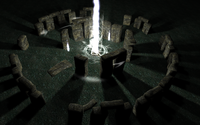
Photo from wikipedia
The density derived electrostatic and chemical (DDEC) approach for calculating the charges of atoms in a metal-organic framework (MOF) is considered to be the most accurate (yet computationally costly) one… Click to show full abstract
The density derived electrostatic and chemical (DDEC) approach for calculating the charges of atoms in a metal-organic framework (MOF) is considered to be the most accurate (yet computationally costly) one among many charge-assignment methods. Here, we conducted a comparative study on five different types of atomic partial charges (namely CM5, Mulliken, Qeq, EQeq and PACMOF) prepared for a subset of MOFs with affordable computational costs and benchmarked them with respect to the DDEC charges, which is particularly relevant because currently most databases lack MOFs with pre-calculated DDEC charges. To find a suitable charge type alternative to the DDEC approach, we statistically ranked the five charge types based on two metrics, the relative standard deviation of charges and relative dipole moment difference, based on which we provide general guidance as well as suggestions for specific MOFs according to bond polarity analyses. Finally, we recommend a possible and more accurate parametrization scheme for future studies.
Journal Title: Nanoscale
Year Published: 2022
Link to full text (if available)
Share on Social Media: Sign Up to like & get
recommendations!